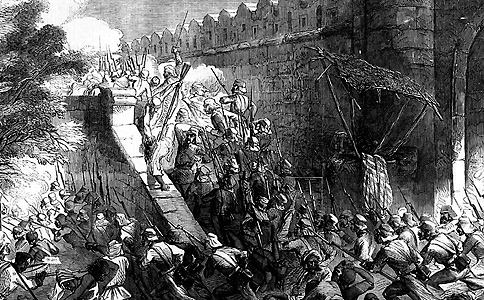Indian Rebellion was a major Indian revolt against British rule in India. The rebellion, sometimes called the Sepoy Rebellion or Sepoy Mutiny, began in 1857 and spread across northern and central India. Thousands of people, mainly Indians, died in the fighting. At the time of the rebellion, a British trading company called the East India Company ruled most of India. In 1858, as a result of the rebellion, the British government took permanent control of the territory from the company. The revolt ended in 1859.

The Indian Rebellion was begun by Indian soldiers, called sepoys, in the army of the East India Company. The sepoys became especially alarmed when the British introduced the new Enfield rifle, which used cartridges greased in a tallow containing beef and pork fat. The cartridges had to be bitten open before being loaded into rifles. But the religious beliefs of the sepoys forbade them to bite open the cartridges. The Hindu sepoys could not eat beef. Sepoys who were Muslims (followers of Islam) could not eat pork.
The rebellion broke out in the military base at Meerut after British officers imprisoned 85 sepoys for refusing to use the cartridges. On May 10, other angry sepoys freed the prisoners and killed many British officers. The rebellion spread rapidly. The sepoys captured several major cities, including Delhi, Kanpur, and Lucknow.
Many other Indians joined the sepoys. They included Indian princes and nobles whose lands had been seized by the East India Company. Other Indians who supported the sepoys resented British attitudes toward the Hindu and Muslim ways of life. They felt threatened by the attempts of British missionaries to convert India to Christianity, and by the pace of modernization.
By the summer of 1858, stronger and better-equipped British forces had defeated most of the rebels. The British government then tried to improve relations with India. It supported big landowners, guaranteed princes their existing territories, and promised never to interfere with the Hindu or Muslim religions. But the rebellion greatly intensified anti-British feelings in India.
See also East India Company ; India, History of (The Indian Rebellion) ; Kanpur .
